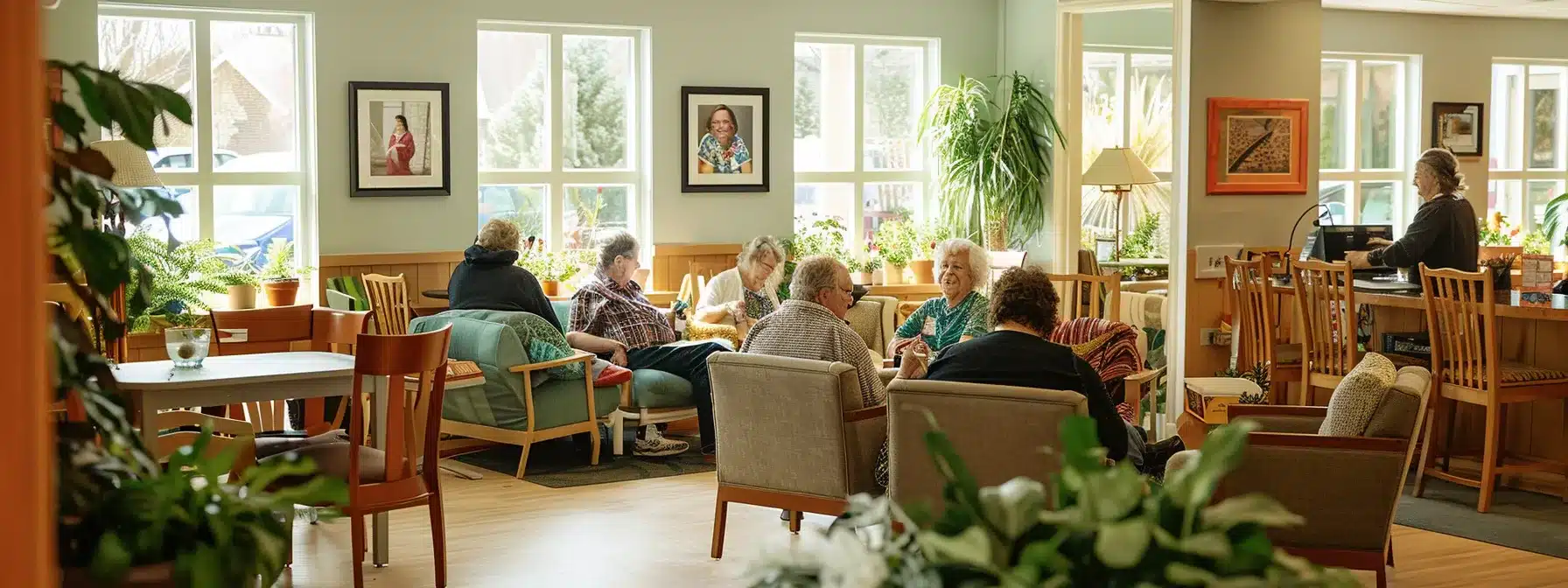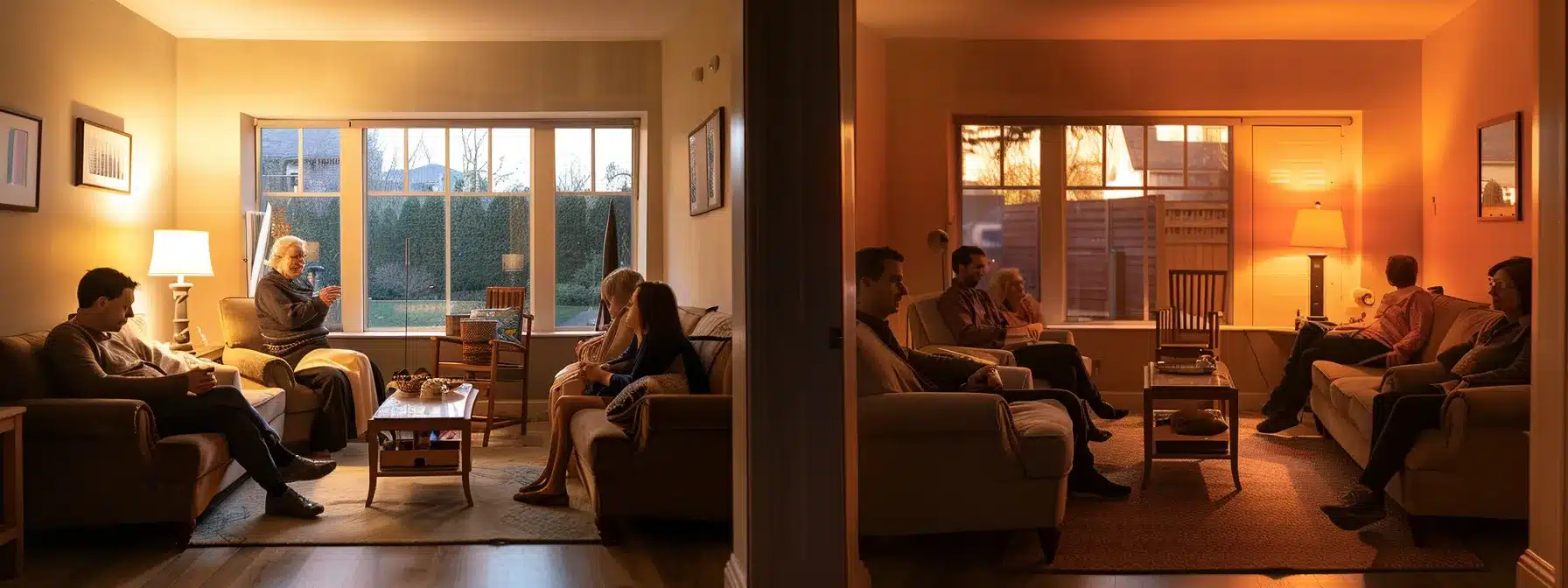Navigate memory care Delray FL with our guide. Discover costs, quality, specialized programs & ensure safe, compassionate support.

Key Insights on Dementia Care Facilities You Should Know
Table Of Contents:
- What to Expect in Dementia Care Facilities: Important Insights
- Key Takeaways
- Understand the Types of Dementia Care Facilities Available
- Explore Services Offered in Dementia Care Facilities
- Recognize Staffing Qualifications and Expertise
- Evaluate Safety Measures and Protocols
- Understand the Cost Structure of Dementia Care
- Learn About Transitioning Into a Dementia Care Facility
- Frequently Asked Questions
- Conclusion
What to Expect in Dementia Care Facilities: Important Insights
Are you concerned about choosing the right dementia care facility? This post explains key points such as the types of dementia care facilities available and the services they provide. It also covers staffing expertise and safety measures. Readers will gain clarity on costs and smooth transitions. The information presented here will help address worries about finding proper care for loved ones.
Key Takeaways
- memory lane assisted living bridges gaps between assisted living, memory care, and home comfort
- the facility offers clear, practical support for dementia and alzheimer’s care
- structured routines and personal meetings ease resident transitions
- tailored programs and regular health monitoring boost overall well-being
Understand the Types of Dementia Care Facilities Available

This section reviews various care options for dementia patients, comparing assisted living services with specialized memory care and skilled nursing facilities for advanced needs. It also discusses in-home care versus facility care choices, examines targeted programs, and identifies short-term respite care opportunities, incorporating insights from physicians and veteran experts in dementia care and nursing.
Review Various Care Options for Dementia Patients
Different care facilities offer varied options for dementia patients. These settings range from facilities focusing on memory care to larger establishments that integrate geriatrics services, with each option designed to serve the unique needs of the patient and sometimes acting as a stimulant for better engagement in daily activities:
The range of options encourages families to assess what aligns with their expectations and ensures that each patient receives the right level of care in geriatrics-focused environments. Facility decisions frequently consider aspects such as daily routines and the potential stimulant effect of structured programs to support overall well-being while balancing sensitive financial factors like life insurance considerations.
Compare Assisted Living and Memory Care Services
Assisted living and memory care services each provide tailored support, yet they differ in key aspects that affect daily routines and overall quality of care; facilities often offer input from a registered nurse to monitor patient status while also considering guidelines set by centers for disease control and prevention. When families review these options, they are guided by real-world examples that address caregiver stress and medicaid eligibility criteria:
Memory care services prioritize specialized programs that improve cognitive well-being, while assisted living facilities offer comprehensive daily support under the supervision of a registered nurse with insights aligned with centers for disease control and prevention advice. Both care settings help families manage challenges related to medicaid and caregiverstress, each presenting distinct advantages based on the patient‘s evolving needs.
Learn About Skilled Nursing Facilities for Advanced Needs
Skilled nursing facilities offer advanced support to manage conditions like alzheimers-care complications and the effective administration of medication under the direct supervision of experienced care providers. These facilities customize treatment plans to alleviate patient pain and meet individual medical needs, with memorylanehome.com serving as a resource for practical guidance.
In these settings, staff members monitor and adjust care routines to address fluctuating requirements efficiently while prioritizing patient comfort and safety. They apply practical insights to ensure that residents receive timely medication and expert support, reducing pain and enhancing overall quality of life.
Discuss in-Home Care Versus Facility Care Choices
The organization at Memory Lane Assisted Living provides clear guidance for consumers evaluating in-home care and facility options, emphasizing that care homes and nursing home settings can offer distinct advantages. Families may find that each arrangement impacts quality of life differently depending on the level of support needed and the available resources.
Industry experts note that in-home care offers a familiar setting that many consumers value, while care homes provide structured environments with dedicated staff to manage daily routines. This practical approach helps families decide on care options that best suit the patient‘s overall needs and quality of life.
Assess Specialized Programs for Dementia Care
Memory Lane Assisted Living offers specialized dementia care programs that integrate structured reminiscence sessions with practical housekeeping measures to maintain a secure environment. These programs carefully assess risk factors and manage drug schedules to deliver assisted care that supports the unique needs of each resident:
- Scheduled drug management
- Individual reminiscence activities
- Ongoing housekeeping supervision
Industry professionals note that such specialized programming provides clear benefits in reducing risk and ensuring patients receive targeted support. Practical examples from assisted living settings show that a routine combining careful drug management, consistent housekeeping efforts, and reminiscence therapy makes a significant difference in the quality of life for individuals with dementia.
Identify Short-Term Respite Care Opportunities
Short-term respite care offers a practical solution for families seeking emergency support during critical situations. This service is available at an assisted living facility where residents can benefit from targeted memory programs and personalized therapy sessions in a memorycare facility setting.
Timely and reliable short-term care options ease family concerns and provide relief when needed, ensuring that patients maintain stability and receive consistent assistance with daily routines. Utilizing specialized memorytherapy and maintaining structured environments, short-term respite care addresses immediate family needs without compromising long-term care goals.
The reader now sees the clear layout of dementia care facilities. The next section offers a closer look at the services that make a real difference.
Explore Services Offered in Dementia Care Facilities

Assisted living communities offer a range of care options to support daily living, from practical assistance and health care services to recreational activities, nutrition plans, and medical monitoring. Residents benefit from emotional support, family programs, and alternatives like home care, ensuring every need is addressed through clear, expert care.
Examine Daily Living Assistance and Support Services
Assisted living facilities focus on daily tasks with a practical approach that supports a healthy brain and ensures residents maintain a high quality of senior living. A dedicated nurse practitioner plays a key role in monitoring routines and aligning them with a clear policy aimed at improving everyday independence.
Service programs integrate reminiscence therapy to boost cognitive engagement while specific support systems help manage daily challenges effectively. The specialized care provided by these facilities reflects the firsthand expertise of professionals who tailor each intervention according to individual needs within a secure framework.
Investigate Recreational and Engagement Activities
Recreational programs in these care facilities focus on engaging residents in activities of daily living that build routine and reduce confusion. Hands-on sessions provide a predictable yet stimulating environment to help manage risk factors and reassure families about the fee-based residential care offered.
Structured engagement activities are designed to improve memory and support daily routines while addressing concerns related to confusion. This practical approach ensures that residents experience meaningful social interaction and financial clarity regarding the fee charged for residential care services.
Discover Nutritional Plans and Dietary Support
Memory care units within dementia care facilities often include nutritional plans that are tailored to each resident’s needs, backed by research from healthcare professionals. This practical approach incorporates dietary support that assists in injury prevention and helps manage the overall health of residents, even when temporary respite care or waiver options are required.
Expert staff design meal programs based on research and first-hand experience to ensure residents receive balanced nutrition and dietary support. Such nutrition plans aid in maintaining overall well-being, proving especially important for patients in memory care units who may rely on specific support measures including respite care and waiver provisions.
Learn About Health Monitoring and Medical Care
The facility provides continual health monitoring and medical care support, ensuring that each resident’s behavior and overall well-being are managed efficiently. Experts at Memory Lane Assisted Living incorporate practical insights such as scheduled transport for appointments and regular oversight from healthcare professionals.
Medical services focus on addressing essential needs unique to assisted livingmemory environments with a clear emphasis on safety, routine, and compliance with law and industry standards:
- Regular vital assessments and medication reviews
- Coordinated transport to offsite appointments
- Integration with adult day care support for social engagement
- Monitoring behavior trends to ensure optimal care
- Adherence to legal health care standards
Understand Emotional and Psychological Support Provided
Residents at a dementia care facility benefit from emotional support that helps stabilize cognition and manage the effects of disease. Professionals provide regular counseling sessions and monitored group activities to foster a secure environment for those with dementia.
Practical strategies are applied to address both emotional and psychological needs while considering aspects such as nutrition and daily care routines. Expert staff closely observe residents, ensuring that individualized support contributes to their overall well-being and engagement.
Review Family Engagement Programs and Resources
The facility offers family engagement programs that connect kin with professional services, such as physical therapy sessions, to support overall well-being. These resources also incorporate guidance on reverse mortgage options and health insurance, which helps families navigate the complexities of elderly care in environments like those in the bronx.
Experienced staff provide clear information and practical insights during family engagement sessions, ensuring that each member understands the roles of both professional support and personal involvement. This approach assists families in making informed decisions about elderly care while benefiting from expert guidance on health insurance and reverse mortgage choices, which are tailored to meet specific needs.
Services tell a story of care in every detail. Next, their expertise and commitment guide every step forward.
Recognize Staffing Qualifications and Expertise
This section reviews training requirements, caregiver-to-resident ratios, ongoing education initiatives, specialized roles, and recruitment practices. It offers practical insights for families seeking accessibility and quality care, as noted by AARP in New York City, Staten Island, and Queens. These key points guide the discussion on staff qualifications and expertise in dementia care facilities.
Look at Training Requirements for Dementia Care Staff
The facility ensures that dementia care staff receive thorough training and periodic assessments to manage conditions such as aggression, while also addressing issues that affect a resident’s supplemental security income and overall income concerns. The training protocols include practical examples from york and county settings, ensuring that staff have firsthand expertise to handle various behavioral challenges confidently.
Staff are educated with a focus on real-life applications and methods that reduce aggressive incidents, using case studies derived from both york and county areas. Their training programs also address the financial concerns of residents, such as supplemental security income and income management, ensuring a balanced approach to enhancing care quality and stability in dementia facilities.
Assess Caregiver-to-Resident Ratios for Quality Care
The ratio of caregivers to residents is a crucial indicator of quality care provided in any dementia facility, and experienced professionals often refer to standards set by the joint commission when evaluating these benchmarks. Facilities that consistently meet these standards show a strong attention to detail and regulatory compliance, which reassures families that their loved ones receive personalized and safe care.
Experts recommend contacting facilities using the provided email address for detailed information on staff ratios, ensuring transparency in the facility’s regulation practices. Submitting a minimal donation inquiry can often lead to more insight about how facilities maintain their caregiver-to-resident balance to support each resident’s needs effectively.
Understand the Importance of Ongoing Education Initiatives
Ongoing education initiatives ensure that dementia care facility staff stay current with guidelines issued by the new york state department of health, promoting best practices for areas such as safe bathroom accessibility and overall resident care. Experts note that continuous training is essential in meeting strict standards set by regional authorities, including insights regarding zip code-specific regulations and oversight by the ombudsman.
Regular educational updates support staff in addressing challenges and adapting care methods in facilities across new hampshire, reinforcing a commitment to quality service. This proactive approach fosters a safe and responsive environment where each resident benefits from experienced professionals who adhere to rigorous training and regulatory compliance.
Learn About Specialized Roles in Dementia Care Facilities
Within dementia care facilities, specialized roles exist to ensure that each resident’s needs are attentively met, including professionals trained in music therapy and primary care. These experts use practical examples from real scenarios to adjust diet plans and monitor weight loss, ensuring that residents receive well-rounded support in environments inspired by the calm of the Hudson River.
Specialized care team members blend clinical skills with complementary practices to address physical and emotional challenges. Their focus on primary care and dietary management, combined with the benefits of music therapy, offers a clear, practical pathway for improved health and well-being in a caring facility setting.
Explore Recruitment Practices and Staff Retention Strategies
The facility’s recruitment practices focus on hiring qualified professionals who treat each resident as a valued asset, ensuring that candidates possess the skills necessary for efficient pain management and daily care. The team reviews applications with input from industry experts in states like Vermont and Long Island to guarantee that each staff member can navigate complex tasks such as managing power of attorney matters.
The facility retains skilled personnel by offering ongoing professional development and competitive incentives that address both clinical and administrative needs. Their efforts include mentorship programs and regular evaluations to ensure that staff maintain high standards in pain management and administrative processes similar to those in renowned facilities in Vermont and Long Island.
Staff members who show quality skills work hand in hand with firm safety practices. Now, assessing these safety steps reveals how care comes with secure surroundings.
Evaluate Safety Measures and Protocols

This section reviews security features, emergency plans, staff safety training, resident monitoring systems, and fall prevention strategies. It explains how wheelchair access, meals on wheels, legal aid, nervous system assessments, and services at sunrise senior living enhance facility safety. Each focus area offers practical insights into maintaining a secure environment for dementia care.
Investigate Security Features in Care Facilities
The facility prioritizes robust entry systems and perimeter monitoring to ensure residents remain safe in an easily accessible courtyard. An evaluation process in states like West Virginia and Wyoming supports the implementation of secure measures while considering elderly pharmaceutical insurance coverage needs:
- Access controls at entry points
- Continuous surveillance and monitoring systems
- Onsite security staff and emergency response protocols
Security features extend to the use of advanced door-lock mechanisms and alarm systems that regularly trigger evaluations to confirm their effectiveness. The practical design of these facilities supports both patient safety and adherence to standards that include elderly pharmaceutical insurance coverage considerations across different regions.
Understand Emergency Preparedness and Response Plans
The facility emphasizes emergency preparedness by incorporating detailed response plans that are accessible via a clear table of contents in their documentation. Policies include guidelines relevant to residents in areas like New Mexico and South Dakota, ensuring each protocol is updated to reflect current license requirements and practical estate planning concerns.
Care managers review emergency response plans regularly to address potential risks in real time, drawing on firsthand experience and practical examples from daily operations. The facility combines structured protocols with precise documentation to provide families with confidence in the process, ensuring estate planning and safety practices align with regional guidelines and license regulations.
Assess Safety Training for Staff Members
Staff members undergo detailed safety training that covers a review of patient medical history and regular inspection protocols to meet stringent standards in the facility. These training sessions are designed to address challenges posed by terminal illness while ensuring that participants follow up-to-date procedures.
Personnel in north dakota facilities receive practical instruction including recreation safety measures and emergency drills for cases involving terminal illness:
- Hands-on emergency drills
- Regular inspection routines
- Review of patient medical history practices
- Recreation safety protocols
Review Resident Monitoring Systems in Place
The facility uses resident monitoring systems that provide consistent oversight of patient safety, offering family caregivers peace of mind as their loved ones engage in daily activities. The practice integrates practical examples from Missouri to ensure that each resident’s routine is recorded and assessed, which supports families looking to manage the price of care while planning for aging in place.
These monitoring solutions help ensure that any fluctuations in a resident’s condition are identified early, allowing staff to take prompt action. This approach supports families in managing concerns such as mortgage planning and long-term care investments, making the systems an essential part of the facility’s commitment to quality care.
Learn About Fall Prevention Strategies
The facility implements fall prevention strategies that include regular floor inspections and real-time monitoring systems, ensuring that residents in dementia care facilities remain safe. Staff apply practical measures, such as non-slip flooring and clear walkways, to reduce the risk of falls, thereby enhancing daily mobility and overall stability.
Expert caregivers assess each resident’s movement patterns to tailor specific interventions that minimize fall hazards. These proactive strategies not only support resident well-being but also provide families with peace of mind knowing that safety measures are a top priority in the care environment.
Safety checks win their place in care, and solid steps always matter. Next, the focus shifts to clear numbers and plans behind expert dementia support.
Understand the Cost Structure of Dementia Care
This section outlines payment methods, insurance benefits, and financial assistance resources available for dementia care. It compares costs across facility types and evaluates care value based on services offered, providing families with practical insights to manage expenses effectively. Each topic guides families through key financial aspects of dementia care, ensuring a clear understanding of pricing structures.
Explore Different Payment Options for Families
Families considering dementia care options benefit from understanding various payment methods available. The facility provides clear options to address different financial situations, such as Medicaid eligibility, private pay, and insurance benefits:
- Medicaid eligibility criteria
- Private pay options for flexible budgeting
- Insurance coverage for assisted living services
- Potential benefits from veteran programs
Each payment option is designed to offer practical solutions that ease financial stress while ensuring quality care. The facility supports families by presenting real-life examples of cost management techniques and providing personalized guidance to simplify decision-making processes.
Learn About Insurance Coverage and Benefits
Memory Lane Assisted Living provides clear guidance on insurance coverage, offering practical insights for families evaluating costs related to dementia care. The facility works closely with insurance providers to secure benefits that assist in managing payment options, ensuring residents receive quality care with minimal financial stress.
Families benefit from personalized consultations that explain how various policies support daily living costs and specialized programs in dementia care. The approach emphasizes transparency and real-world examples to help decision-makers understand available insurance benefits while addressing common financial concerns.
Assess Potential Financial Assistance Resources
Memory Lane Assisted Living offers practical guidance on identifying financial assistance resources that ease cost concerns for dementia care. Families can benefit from personalized consultations that highlight available support options such as Medicaid benefits, veteran programs, and local grants:
- Medicaid benefits
- Veteran support programs
- Local grant opportunities
Experienced professionals at the facility share actionable insights on accessing funding resources to help manage expenses. They ensure that families understand how various financial solutions can support long-term care needs while reducing financial stress.
Compare Costs Across Different Facility Types
The facility compares costs by evaluating daily support levels, care options, and specialized services offered in dementia care settings. This practical insight helps families understand that assisted living and memory care environments present different pricing models based on patient needs and service intensity.
Industry experts note that cost differences arise from varying care routines and staffing levels within each facility type. Their analysis enables families to identify the best value option that meets both quality care and budget considerations.
Evaluate the Value of Care Based on Services Offered
The value of care is determined by the range of services provided, including daily support, cognitive programs, and personalized health monitoring. The comprehensive support offered under these services ensures that each resident’s unique care needs are met, resulting in improved daily routines and overall stability.
Expert evaluations show that facilities offering integrated services help families manage both care quality and costs effectively. Clear communication regarding each service helps guide family decisions and provides assurance that residents receive the attention they require in a supportive environment.
Understanding the cost structure gives clear insight into what care truly requires. Next, simple steps show how to make a smooth transition into a place that feels like home for every loved one.
Learn About Transitioning Into a Dementia Care Facility

This section outlines key steps during the admission process, offers ideas to ease the transition for residents, reviews effective communication with family members, and details the initial orientation for new residents. It provides clear guidance on adapting to life in a dementia care facility to support families and caregivers in making well-informed decisions.
Understand What to Expect During the Admission Process
The admission process at Memory Lane Assisted Living begins with a thorough assessment of each resident’s needs, ensuring that the specialized dementia care program aligns with the individual’s daily routines and medical requirements. The staff explains the steps involved, offering practical insights based on firsthand experience in managing transitions for those living with Alzheimer’s and other forms of dementia.
During admission, families receive clear information about personalized care plans, medication management, and daily support services provided in a small residential setting. The facility guides the transition with detailed documentation and regular follow-ups, ensuring that every resident feels secure and supported from the start.
Discover Ways to Ease the Transition for Residents
Memory Lane Assisted Living supports residents by offering clear, structured routines and personal introductions to new surroundings to ease the move into the facility. Effective transition includes individual meetings with care staff to address unique needs and provide reassurance during the early stages of residency:
The facility provides a calming environment where clear communication and direct guidance are prioritized to make the transition smooth. Well-planned orientation sessions and measured introductions help ensure that every resident feels supported and prepared for their new daily routines.
Review Communication Strategies With Family Members
Communication strategies with family members start with a dedicated meeting where staff outlines the transition process and clarifies key aspects of the dementia care program. This practical approach ensures that relatives receive clear guidance, regular updates, and actionable advice to support their loved ones during the transition into the facility:
The facility employs consistent communication methods to ease concerns and promote an understanding of care practices among family members. This clear, structured approach empowers kin with firsthand expertise and practical examples of effective communication during the transition process.
Discuss the Initial Orientation for New Residents
The initial orientation is structured to provide clear guidance and direct support for new residents, ensuring that they understand daily routines, safety protocols, and available services in the dementia care facility:
- Personal meetings with care staff to explain routines
- A comprehensive tour of the facility
- Detailed explanation of medication management and scheduled activities
The facility ensures that residents feel secure and informed during the early stages of transition; experienced staff explain practical steps and provide personalized insights that ease adjustment while addressing specific care needs.
Learn About Adapting to Life in a Care Facility
The transition to a care facility is made smoother by guided orientation and hands-on support from experienced professionals at Memory Lane Assisted Living. Residents quickly adjust to new daily routines supported by personalized care plans that address individual needs and ensure comfort during the early stages of residency.
Clear communication with staff fosters a confident approach to adapting to life in the facility, with regular consultations providing practical insights into daily activities and health monitoring. The structured environment and proactive health support enable residents to develop a steady routine that meets their medical and personal care requirements.
Frequently Asked Questions
What types of facilities does Memory Lane offer for dementia care?
Memory Lane Assisted Living provides personalized memory care in small residential settings using adult foster care that offers specialized dementia care with an emphasis on human connection and quality time.
What specific services are available at Memory Lane?
Memory Lane offers person-centered services in a small residential setting, specializing in adult foster care, memory care, and tailored dementia support, ensuring attention and comfort for seniors and their families in the Ypsilanti and Ann Arbor area.
How is staff expertise demonstrated in these facilities?
Staff expertise is evident through personalized attention and proven dementia care methods, with a focus on individual well-being in a warm, residential setting. A skilled team supports health and comfort for those with Alzheimer’s and related conditions.
What safety protocols are followed at Memory Lane?
At Memory Lane Assisted Living, trained staff adhere to strict hygiene, secure facility design, and emergency response protocols while providing specialized dementia care to ensure resident wellbeing and safety.
What cost considerations are involved when transitioning into care?
Transitioning into care requires thoughtful consideration of room rates, specialized dementia support, and personalized services that bridge adult foster care and memory care, ensuring quality treatment and peace of mind for families.
Conclusion
Dementia care facilities provide clear guidance and personalized support that ease the transition and ensure residents feel secure in their new environment. The facilities offer structured routines, specialized programs, and ongoing communication with families to maintain a stable and informed care experience. Trained professionals work closely with residents to manage daily activities, medication, and health monitoring. These practical insights empower families to make informed decisions and experience the value of focused, person-centered care.


